O. Henry’s Full House (1952) starring Anne Baxter, Richard Widmark, Farley Granger, Charles Laughton, Marilyn Monroe
Synopsis of O. Henry’s Full House
O. Henry’s Full House is an anthology of five of O. Henry’s short stories, well-acted and well-directed, that are well worth watching.
![]() Charles Laughton and Marilyn Monroe light up the screen in The Cop and the Anthem, a hilarious tale about a hobo looking to spend the cold night in a warm jail, while Dale Robertson and Richard Widmark go head-to-head in the murder mystery of The Clarion Call. The Last Leaf stars Anne Baxter and Jean Peters in a touching story about hope in the face of despair, and Fred Allen and Oscar Levant discover perils inherent in kidnapping a ten-year old terror in The Ransom of Red Chief, which was directed by Howard Hawks! The heartwarming finale to the collection is delivered with grace by Jeanne Crain and Farley Granger in The Gift of the Magi, a story about selflessness and love on Christmas morning.
Charles Laughton and Marilyn Monroe light up the screen in The Cop and the Anthem, a hilarious tale about a hobo looking to spend the cold night in a warm jail, while Dale Robertson and Richard Widmark go head-to-head in the murder mystery of The Clarion Call. The Last Leaf stars Anne Baxter and Jean Peters in a touching story about hope in the face of despair, and Fred Allen and Oscar Levant discover perils inherent in kidnapping a ten-year old terror in The Ransom of Red Chief, which was directed by Howard Hawks! The heartwarming finale to the collection is delivered with grace by Jeanne Crain and Farley Granger in The Gift of the Magi, a story about selflessness and love on Christmas morning.
Review of O. Henry’s Full House
O. Henry’s Full House is a very well-done anthology of five of his short stories. They’re effectively five short films, connected only by narration – by John Steinbeck. They’re all excellent, and all worth watching. The five films are:
The Cop and the Anthem.
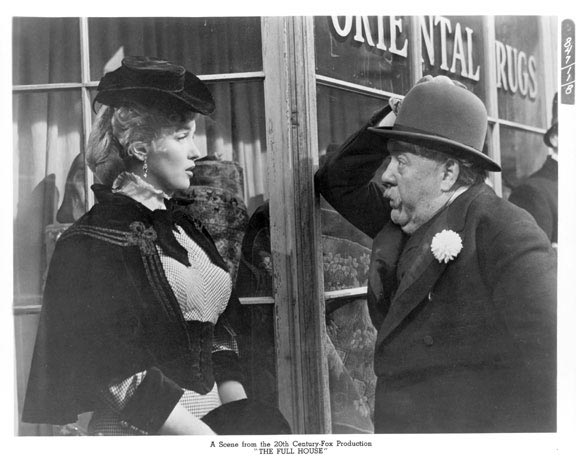
Charles Laughton absolutely shines as a hobo who simply wants to be arrested and spend the winter in a warm, cozy jail cell. But every attempt fails hilariously! Red Skelton did the same story on his TV show, but no better than here. Marilyn Monroe has a very minor appearance here as a street walker, that Laughton’s character is kind to. It’s a very sweet story, and one of my favorites.
The Clarion Call
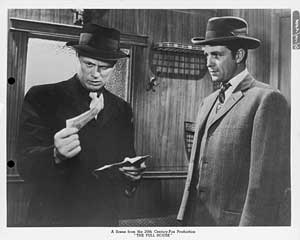
Dale Robertson and Richard Widmark go head-to-head in a murder mystery. It’s not a mystery to the audience – the real conflict is between the two characters, two childhood friends who are now on the opposite side of the law. And the criminal is holding something over the police officer’s head …
The Last Leaf
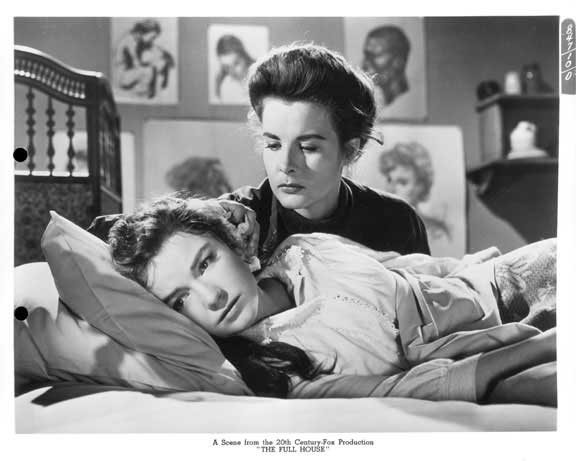
The Last Leaf is a bittersweet story. Anne Baxter and Jean Peters are sisters in a poor neighborhood, where a pneumonia epidemic is in full force. One of them is dying, and watches a vine through their window. It’s autumn, and she’s convinced that when the last leaf fulls, she’ll die. To give her hope, an old artist in the building, played wonderfully by Gregory Ratoff, paints a realistic leaf on the side of the building. So, the last leaf never falls, and the young woman recovers both her hope and her health. Sadly, the old artist dies of pneumonia from being out in the cold, painting that leaf. It’s an O. Henry story, after all.
The Ransom of Red Chief
The Ransom of Red Chief is a hilarious story, about a pair of would-be kidnappers ( Fred Allen and Oscar Levant) who kidnap a young, spoiled … and dangerous … brat. Who, after humiliating and hilarious interactions with their “victim” pay the father to take him back! The story’s been old other times, but never funnier than here. Kathleen Freeman appears as the boy’s mother.
The Gift of the Magi
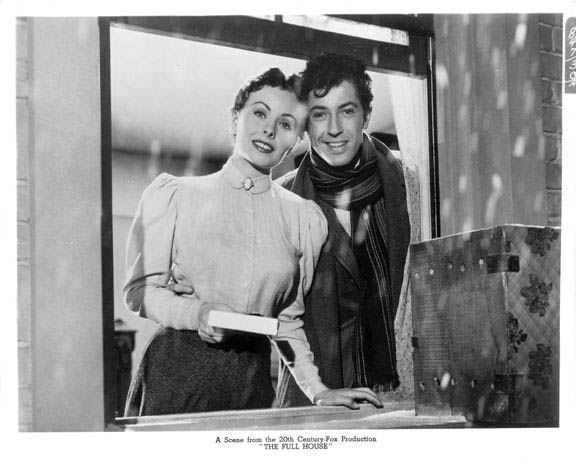
The Gift of the Magi is a wonderful Christmas story, starring Jeanne Crain and Farley Granger as a poor young couple who can’t afford to buy either other Christmas presents. So, the young wife sells her long, beautiful hair to a wig maker, to buy the husband a gold chain for his watch. The husband sells the watch, a family heirloom, to buy her a beautiful brush and comb set for her luxurious hair. And they both love each other all the more. Character actor Sig Ruman shines as the shopkeeper she buys the chain from … and she’s short of money.
Songs
- Bringing in the Sheaves (1880), Music by George A. Minor, Lyrics by Knowles Shaw
- After the Ball (1892), Written by Charles Harris
- Gwine to Rune All Night (De Camptown Races) (1850), Written by Stephen Foster
- Softly and Tenderly Jesus Is Calling (1880), Written by Will L. Thompson
- Frankie and Johnny (1912), Music by Bert Leighton and Frank Leighton
- Adeste Fidelis (O Come All Ye Faithful) (ca 1743), Music attributed to John Reading
- Silent Night, Holy Night(1818), Music by Franz Xaver Gruber
- O, Little Town of Bethlehem (1868), Music by Lewis H. Redner
- Joy to the World, Music by Lowell Mason (1836), Lyrics by Isaac Watts (1719)
- Hark! The Herald Angels Sing (1856), Music by Felix Mendelssohn (1840), Hymn by Charles Wesley (1730)
Cast
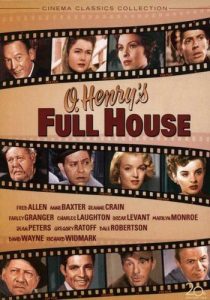
- The Cop and the Anthem
- Charles Laughton (Les Miserables, Island of Lost Souls)
- Marilyn Monroe (Some Like it Hot, Gentlemen Prefer Blondes)
- The Clarion Call
- Dale Robertson (Son of Sinbad)
- Richard Widmark (Road House)
- The Last Leaf
- Anne Baxter (Angel on my Shoulder, The Fighting Sullivans)
- Jean Peters (Three Coins in the Fountain)
- Gregory Ratoff (What Price Hollywood?)
- The Ransom of Red Chief
- Fred Allen (Love Thy Neighbor)
- Oscar Levant (The Band Wagon, An American in Paris)
- Kathleen Freeman (The Disorderly Orderly, The Fly)
- The Gift of the Magi
- Jeanne Crain (State Fair)
- Farley Granger (Strangers on a Train)
- Sig Ruman (Ninotchka, A Night at the Opera)
Editorial review of O. Henry’s Full House
O. Henrys Full House is a recently repolished cinema gem, a must for film fans and for those who love the short stories of O. Henry (born William Sidney Porter). This collection features five of O. Henrys tales made into short films, and released in theaters in 1952 as a collection–an experiment in adapting short stories as simple short films, not padded out to theatrical lengths. The collection features a stable of 20th Century Foxs top contract players, including Anne Baxter, Richard Widmark, Farley Granger, and a dewy-cheeked Marilyn Monroe, and five topnotch directors including Henry Hathaway and Howard Hawks.
The five stories include O. Henrys signature tale of grace and selflessness, “The Gift of the Magi,” as well as “The Cop and the Anthem” (in which a hobo literally cant get himself arrested); “The Clarion Call” (a noirish crime mystery with loads of side-of-the-mouth cracks, like calling a guy “You clamhead!”); “The Last Leaf” (with a radiant Baxter and Jean Peters); and “The Ransom of Red Chief,” a kidnap cautionary tale. The twists that O. Henrys stories are famous for perhaps work better on the page than on film, and yet the acting and production values are so superb the tales are moving and their short lengths are just right.
The extras are another literary treasure trove. The stories are introduced and narrated by none other than a chain-smoking John Steinbeck, whose admiration for O. Henry permeates his speeches. Other features include a commentary by Dr. Jenny Lind Porter, a featurette on the life and writing of O. Henry (every bit as tragic as his most bittersweet fiction), galleries, stills, and two additional shorts from 1927, “Girls” and “Man About Town.” –A.T. Hurley


